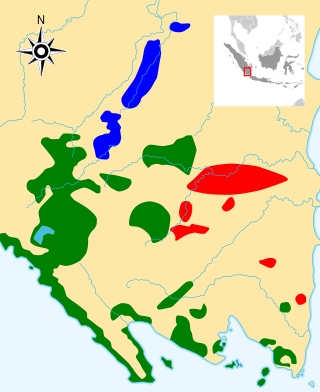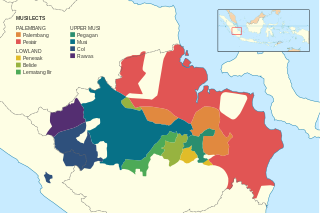
Minangkabau is an Austronesian language spoken by the Minangkabau of West Sumatra, the western part of Riau, South Aceh Regency, the northern part of Bengkulu and Jambi, also in several cities throughout Indonesia by migrated Minangkabau. The language is also a lingua franca along the western coastal region of the province of North Sumatra, and is even used in parts of Aceh, where the language is called Aneuk Jamee.
Krio Dayak is a Kayan language of the Krio Dayak people in West Kalimantan, Indonesia.

The Agency for Language Development and Cultivation, formerly the Language and Book Development Agency and the Language Centre, is the institution responsible for standardising and regulating the Indonesian language as well as maintaining the indigenous languages of Indonesia. It is an agency under the Ministry of Education, Culture, Research and Technology of Indonesia.

Lampung or Lampungic is an Austronesian language or dialect cluster with around 1.5 million native speakers, who primarily belong to the Lampung ethnic group of southern Sumatra, Indonesia. It is divided into two or three varieties: Lampung Api, Lampung Nyo, and Komering. The latter is sometimes included in Lampung Api, sometimes treated as an entirely separate language. Komering people see themselves as ethnically separate from, but related to, Lampung people.
The Simeulue language is spoken by the Simeulue people of Simeulue off the western coast of Sumatra, Indonesia.
The Minahasan languages are a subgroup of the Austronesian languages spoken by the Minahasa people in northern Sulawesi, Indonesia. They belong to the Philippine subgroup.
Lawangan is an Austronesian language of the East Barito group. It is spoken by about 100,000 Lawangan people living in the central Kalimantan, Indonesia. Lawangan has a high degree of dialectal diversity.

Palembang, also known as Palembang Malay, is a Malayic variety of the Musi dialect chain primarily spoken in the city of Palembang and nearby lowlands, and also as a lingua franca throughout South Sumatra. Since parts of the region used to be under direct Javanese rule for quite a long time, Palembang is significantly influenced by Javanese, down to its core vocabularies.
The Biatah language is spoken in the Malaysian state of Sarawak and the Indonesian province of West Kalimantan. It belongs to the Malayo-Polynesian branch of the Austronesian language family.
Banda is an Austronesian language of the Central Maluku subgroup. Along with Kei, it is one of the two languages of the Kei Islands in the Indonesian province of Maluku.
Waropen is an Austronesian language spoken at the Cendrawasih Bay of Indonesian Papua. It is fairly closely related to the Yapen languages. Dialects are Waropen Kai, Napan, and Ambumi.
Tombulu, also known as Minahasan language, is an Austronesian language of northern Sulawesi in Indonesia. It is a Minahasan language, a sub-group of the Philippine languages.

Musi is a Malayic variety spoken primarily in parts of South Sumatra, Indonesia. While the name Musi in the broad sense can also refer to the wider Musi dialect network comprising both Upper Musi and Palembang–Lowland clusters, it is locally used as an endonym specific to the variety spoken in the upstream parts of Musi River.
Kendayan, or Salako (Selako), is a Malayic Dayak language of Borneo. The exact number of speakers remains unknown, but is estimated to be around 350,000.
Basap is an Austronesian language spoken in Borneo, Indonesia.
Pakpak, or Batak Dairi, is an Austronesian language of Sumatra. It is spoken in Dairi Regency, Pakpak Bharat Regency, Parlilitan district of Humbang Hasundutan Regency, Manduamas district of Central Tapanuli Regency, and Subulussalam and Aceh Singkil Regency.
Suwawa is a Philippine language spoken in North Sulawesi (Celebes), Indonesia. It is also known as Bonda, Bone, Bunda, Bune, Suvava, and Toewawa. The language mostly spoken in Suwawa District, Regency of Bone Bolango.
Dusun Deyah, or Deyah, is a language spoken by a group of Dusun people of South Kalimantan province, Indonesia. It is spoken in Tabalong Regency across two districts: Haruai, in the villages of Kinarum, Kaong, Pangelak, and Bilas, and Muara Uya, especially in the village of Mangkopom.
Cirebon Sundanese is a variety of conversation in Sundanese in the ex-Residency of Cirebon and its surroundings, which includes Kuningan, Majalengka, Cirebon, Indramayu and Subang as well as Brebes in Central Java.
Koestijah, who commonly published as Rara Koestijah was a Javanese language writer of the Dutch East Indies known primarily for the short stories she published in the 1930s and early 1940s in the magazine Panjebar Semangat. Her short stories dealt with themes of interpersonal moral conflicts, class difference, and marriage.





